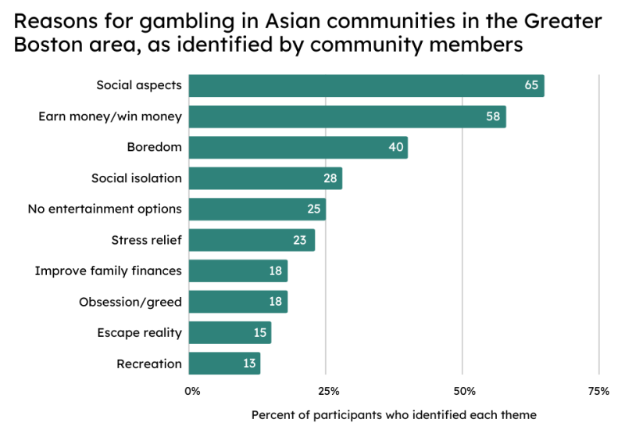Read the original article on The Basis HERE.
By Kira Landauer, MPH
Editor’s Note: Today’s review is part of our month-long Special Series on Asian American/Pacific Islander (AAPI) Addiction Research. Throughout May, The BASIS is examining forms of addiction among AAPI communities.
Emerging research indicates that the Asian American community is at greater risk for problem gambling than the general population. However, research often fails to include or accurately capture the realities of gambling and problem gambling within this community, particularly the experiences of Asian American working-class immigrant communities. This week, as part of our Special Series on Asian American/Pacific Islander Addiction Research, The WAGER reviews a study by Mia Han Colby and colleagues that investigated the systemic issues that contribute to gambling in the Greater Boston Asian American community.
What was the research question?
What are the systemic issues that contribute to gambling in the Asian American community of the Greater Boston area?
What did the researchers do?
The authors conducted forty semi-structured interviews with adult members of Asian1 immigrant communities in the Greater Boston area who had a family member, friend, neighbor, or coworker who gambled. Using a community-based participatory research approach, bilingual/bicultural community fieldworkers who had experience working in their respective communities interviewed participants. Participants were asked about their perceptions of gambling in their community, as well as impacts of gambling on families and the community more generally. The researchers analyzed the interviews for common themes pertaining to systemic issues related to gambling and problem gambling in the Asian community in the Greater Boston area.
What did they find?
The interviews revealed how the underlying issues of poverty and social and cultural loss due to immigration contribute to gambling in this community (see Figure). Many participants spoke about the challenges of making a decent living as an immigrant while working low-wage and stressful jobs. Gambling was viewed as a way to make money and improve a family’s financial situation. For example, one participant expressed that gambling gave them “hope that they can have freedom of money.” It was also seen as a way to relieve work-related stress.
Participants also spoke about the challenges of integrating into American society due to cultural and linguistic barriers. Many discussed the lack of appropriate and accessible social and recreational activities, which contributed to experiences of social isolation, loneliness, and boredom. Gambling—especially within casinos—was viewed as a means of socializing and connecting with other Asian community members. Many participants spoke about the ways that casinos targeted Asian clientele, including busing directly to casinos from Asian communities (e.g., from Boston’s Chinatown neighborhood), creating an Asian-friendly casino environment (e.g., employees speak Asian languages, concerts and events featuring Asian artists), and incentives (e.g., free food and discounts).

Figure. Reasons for gambling in Asian communities in the Greater Boston area, by percentage of respondents who identified each reason for gambling (n = 40). Click image to enlarge.
Why do these findings matter?
These findings illustrate the complex and systemic issues that contribute to gambling in Asian communities in the United States, including social and cultural isolation due to challenges integrating into American society, and struggles working low-wage and stressful jobs. Asian CARES (Center for Addressing Research, Education, and Services) of Boston created actionable recommendations for change based on these findings. They recommend investing in neighborhoods where Asian immigrants live and work to create inclusive spaces that facilitate social and recreational activities other than gambling. Additionally, Asian CARES recommended increasing funding to trusted community-based organizations (e.g., Boston Chinatown Neighborhood Center) that provide culturally and linguistically responsive problem gambling, mental health, and social services (e.g., services that help individuals find and maintain employment).
Every study has limitations. What are the limitations of this study?
Data were self-reported and based on past experiences, so the results might be subject to recall bias. Findings from this study might not be generalizable to other geographic areas or to other immigrant populations.
For more information:
Do you think you or someone you know has a gambling problem? Visit the National Council on Problem Gambling for screening tools and resources. For individuals in Massachusetts looking for culturally and linguistically relevant problem gambling services, call the Massachusetts Problem Gambling Helpline (800-327-5050) or visit the Boston Chinatown Neighborhood Center website.
1. Interviews were conducted with members of the Khmer, Chinese, Korean, and Vietnamese immigrant communities in the Greater Boston area.

